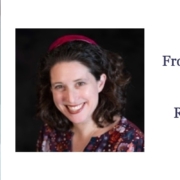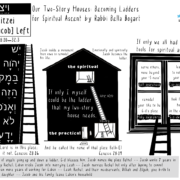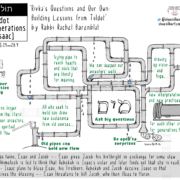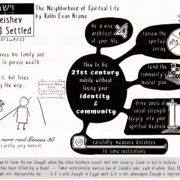Vayechi: Connecting the Dots

Part of an ongoing series that explores Torah through an ethic of social justice and building a world worthy of the Divine.
This week’s parsha, וַיְחִ֤י, Vayechi, is the final installment of the first book of the Torah, of Sefer Bereishit.
In sefer Bereishit, Genesis, we move from the macro, wide angle perspective on the whole of creation (heaven and earth, animals, waters and sky, heavenly bodies, us, Shabbat), to a zoomed-in micro one focused on one line of one family tree – the stories of Sarah and Abraham, Isaac and Rebecca, Jacob (aka Israel) and Leah and Rachel, and Joseph and the rest of Jacob’s children.
The characters in the biblical narrative are incredibly, well, human. They are conflicted, complex, messy, pushy, compassionate, rude, unruly, loving, welcoming, short, caring, insensitive, forgiving, and more. There is a lot going on and there is a lot to resolve, particularly among Jacob’s children, between Joseph and his siblings.
In next week’s parsha, Shmot (Exodus), we transition from a family story of the descendants of Abraham, to a national story, the birth of the Jewish, Israelite nation in Egypt, and we are introduced to Moses, the ultimate Jewish leader, who is tasked with taking the Israelites out of bondage to freedom, from service as slaves into divine covenant and service with God.
Why does Bereishit/ Genesis end where it does? What does it teach us?
In order for Jacob’s/ Israel’s family story to grow into a national story, there first has to be reconciliation and an ability to connect across difference.
Indeed, the last chapter of Bereishit has an interesting insert in the text.
First, we are told that Jacob, the patriarch, dies. Joseph has him embalmed in Egypt and gets leave from Pharaoh to bury his father in the cave of the Machpelah, the burial site purchased by Abraham, along with his forebears. Joseph and his brothers and their families then return to Egypt, where they settle.
Here an interesting insert appears in the narrative (at Genesis 50:15-21). Joseph’s brothers are afraid that Joseph still bears a grudge against them for all they did to him back in his youth (throwing him in a pit, selling him off as a slave), and that with their father dead nothing is now stopping Joseph from taking revenge. So they tell Joseph a wee lie, sending him a message that before Jacob’s death, Jacob left the instruction: “So shall you say to Joseph, ‘Forgive, I urge you, the offence and guilt of your brothers who treated you so harshly.’ Therefore, please forgive the offence of the servants of the God of your father.”
Joseph cried upon hearing this. His brothers then flung themselves before him and said they were prepared to be his slaves. Joseph replied: “Have no fear! Am I a substitute for God? Besides, although you intended me harm, God intended it for good, so as to bring about the present result—the survival of many people. And so, fear not. I will sustain you and your children.”
And the exchange ends with the following tex at verse 21: “ וַיְנַחֵ֣ם אוֹתָ֔ם וַיְדַבֵּ֖ר עַל־לִבָּֽם”, “Thus he comforted them and spoke to their hearts.”
This remarkable passage contains important lessons in leadership and the key to the transition from a familial story to a national story.
First, Joseph demonstrates leadership qualities acquired with experience and maturity – the power of peace and forgiveness, and the ability to look back on past events in the light of new insights and experiences. He is able to see past his own hurt to grasp the bigger picture of God’s will and role. He doesn’t deny his own pain, but he is able to let go of it and not have it control him. He is able, in a sense, to own his past based on what he has learned since.
Second, Joseph is able to do something both special and fundamental to connect with his brothers. He is able to fully open his heart to them, people who he loved but who had also really hurt him (literally left him for dead and then sold him as a slave). The language at verse 21 is amazing: וַיְנַחֵ֣ם אוֹתָ֔ם וַיְדַבֵּ֖ר עַל־לִבָּֽם.
Joseph is able to speak to their hearts, without any cover or artifice.
Rabbi Nachman of Breslov writes about this in Likutei Moharan 34:8:
וְזֶה שֶׁכָּתוּב אֵצֶל יוֹסֵף (שם מה): כִּי פִּי הַמְדַבֵּר אֲלֵיכֶם; וּפֵרֵשׁ רַשִׁ”י: כְּפִי כֵּן לִבִּי. הַיְנוּ שֶׁהֵאִיר הַנְּקֻדָּה שֶׁלּוֹ בַּוָּאו שֶׁלּוֹ, שֶׁהֵאִיר ‘פִּי יְדַבֵּר חָכְמוֹת’, בְּ’הָגוּת לִבִּי תְבוּנוֹת’. וּכְתִיב בּוֹ (שם נ): וַיְדַבֵּר עַל לִבָּם; פֵּרֵשׁ רַשִׁ”י: דְּבָרִים הַמִּתְיַשְּׁבִין עַל הַלֵּב. הַיְנוּ שֶׁהֵאִיר הַנְּקֻדָּה כְּלָלִיּוּת שֶׁלּוֹ, בְּלֵב כָּל יִשְׂרָאֵל:
This is also what is written in connection to Yosef: “that my own mouth is speaking to you” (Genesis 45:12). Rashi explains: “As my mouth is, so is my heart.” In other words, he shone his nekudah into his vav; he shone “My mouth utters wisdom” into “and the meditations of my heart are understanding.” And it is written of him (Genesis 50:21), “and he spoke to their hearts,” which Rashi explains: words that calm the heart. That is, he shone his encompassing nekudah into all <their> hearts.
The nekudah is that spark of God, the yud, that we all have within us, no matter our differences.
Joseph here, as Reb Nachman explains, is able to connect, to shine, his nekudah, his God-spark, to those of his brothers.
By doing so, he and his brothers are, finally, fully reconciled.
It can be very hard to access our own internal sparks of God, the nekudahs of love, let alone others’. But we must try, for that is how we can ultimately be reconciled and redeemed.
As noted by Lord Rabbi Jonathan Sacks z’l regarding Joseph’s connection with his brothers:
“The episode is moving in itself, but it also resolves one of the central questions of the book of Genesis – sibling rivalry: Cain and Abel, Isaac and Ishmael, Jacob and Esau, Joseph and his brothers. Can brothers live peaceably with one another? This question is fundamental to the biblical drama of redemption, for if brothers cannot live together, how can nations? And if nations cannot live together, how can the human world survive?
Only now, with the reconciliation of Joseph and his brothers, can the story move on to the birth of Israel as a nation, passing from slavery to freedom.”
Bereishit ends by giving us some of the key tools to be able to honour God’s work of creating this world by making it a place where we can all live.
May we use these tools, the sparks of God within us, to engage in the work of connection and reconciliation that our world so desperately needs right now, to bring about transformation and redemption.
Chazak chazak v’nitchazek!
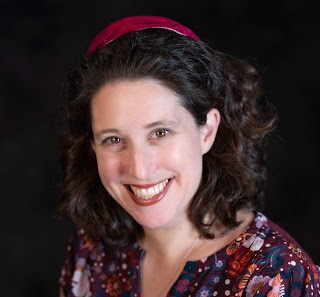
Rabbi Dara Lithwick, the lead builder at Builders Blog, is an advocate for LGBTQ2+ inclusion within diverse Jewish spaces and for Jewish inclusion in LGBTQ2+ spaces. When not at work as a constitutional and parliamentary affairs lawyer, Rabbi Dara chairs the Reform Jewish Community of Canada’s Tikkun Olam Steering Committee and is active at Temple Israel Ottawa. She is a member of Bayit’s Board of Directors. She previously offered a version of this d’var Torah, in different form, in 2020.
Image source: File:Gacrux.jpg – Wikimedia Commons


